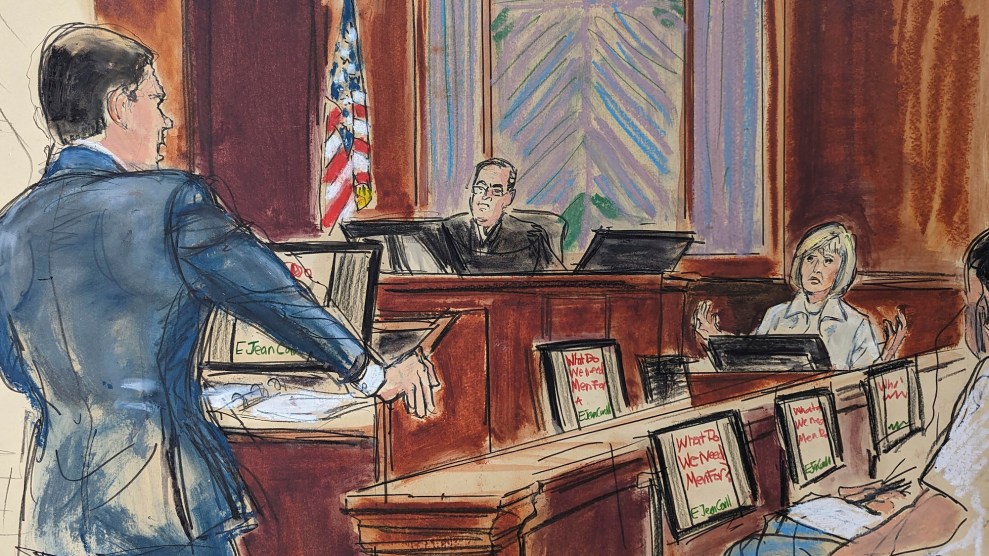
In this courtroom sketch, E. Jean Carroll, right, is cross examined by Former President Donald Trump's defense attorney Joe Tacopina, left, in federal court in New York, Thursday, April 27, 2023. Trump's lawyer went on the attack Thursday against writer Carroll's claims that she was raped by Trump in the 1990s, using cross examination to try to discredit the longtime advice columnist before a jury at a New York civil trial. Elizabeth Williams/AP
The judge in Donald Trump’s civil rape and defamation trial denied a request by the former president’s attorney to grant a mistrial in the case on Monday. The motion, which was filed Sunday night by Trump attorney Joe Tacopina, amounted to a laundry list of complaints that Judge Lewis Kaplan hadn’t been fair to Tacopina, especially on Thursday of last week. Kaplan did spend much of that day correcting and interrupting Tacopina as he attempted to cross-examine writer E. Jean Carroll, who has accused Trump of raping her in 1996 in a dressing room at the Bergdorf Goodman department store in New York City. Although Carroll has acknowledged some potential gaps in her story—for example she does not remember the exact date—Tacopina struggled to get Carroll to flinch from her version of the incident, which Trump denies ever happened.
Tacopina’s letter to the judge on Sunday was a summation of his problems in court on Thursday.
Among other things, Tacopina complained that Kaplan had mischaractarized evidence to the jury; that Kaplan had agreed too often with Carroll’s attorney’s objections that Tacopina was being too argumentative; and that Kaplan had warned Tacopina that Trump might face jury-tampering charges if he and his children continued to post inflammatory things about the case on social media.
The latter compliant stems from a back-and-forth between Kaplan and Tacopina on Wednesday, in which the judge scolded Tacopina for posts on Truth Social that Trump had made in which he brought up the possibility of there being DNA evidence that was not being used, which he said was unfair to him—Carroll says she has the dress she wore the day of the alleged assault, but Trump initially refused to submit a DNA sample. Trump also complained that LinkedIn founder Reid Hoffman is paying for Carroll’s legal team. Both subjects—the possibility of DNA evidence existing and Hoffman’s involvement—were declared off-limits to talk about in front of the jury, and Kaplan said he was concerned that Trump’s posts were designed to reach the jury’s eyes. When Eric Trump followed up with Twitter posts about Hoffman, Kaplan warned Tacopina again.
“Remedies that might be available from this Court may not be the only relevant remedies. If I were in your shoes, I’d be having a conversation with the client,” Kaplan warned Tacopina. “Eric Trump isn’t here before me, so you don’t have to defend Eric Trump. I am simply suggesting to you that there are some relevant United States statutes here and somebody on your side ought to be thinking about them.”
In court, Tacopina had assured Kaplan that he understood the judge’s concerns and that he was indeed thinking about the relevant federal laws. Trump has not posted about the case since the warnings, and Eric Trump subsequently deleted his tweet.
Kaplan denied the request for a mistrial in court Monday, but Tacopina did tell a reporter that he thought the letter had some value.
Kaplan shot down Trump’s mistrial request, but Tacopina doesn’t think it was a fool’s errand, on the lunch break telling me he thinks the judge is sustaining fewer objections. We’ll see how the afternoon goes.
Carroll will return to the stand momentarily.
— Molly Crane-Newman (@molcranenewman) May 1, 2023
















